 Petzlover
Petzlover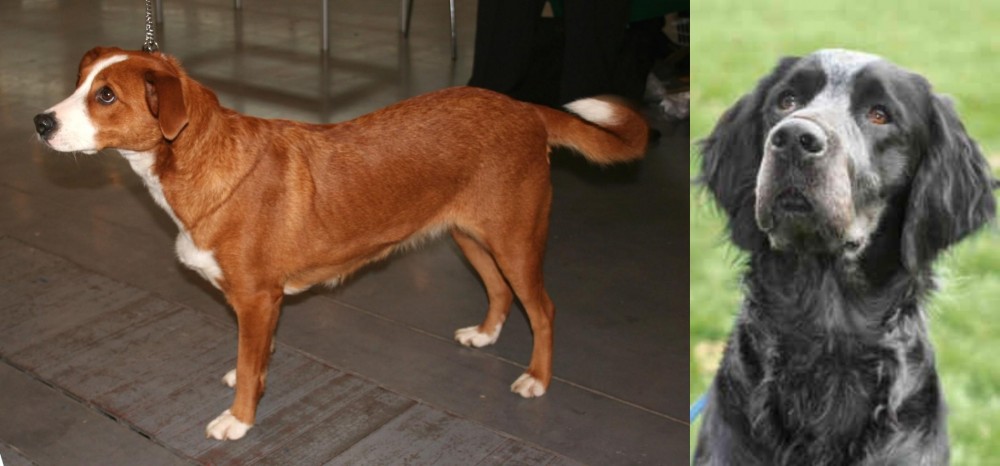 Austrian Pinscher is originated from Austria but Picardy Spaniel is originated from France. Austrian Pinscher may grow 11 cm / 4 inches shorter than Picardy Spaniel. Austrian Pinscher may weigh 7 kg / 15 pounds lesser than Picardy Spaniel. Both Austrian Pinscher and Picardy Spaniel has same life span. Both Austrian Pinscher and Picardy Spaniel has almost same litter size. Austrian Pinscher requires High Maintenance. But Picardy Spaniel requires Moderate Maintenance
Austrian Pinscher is originated from Austria but Picardy Spaniel is originated from France. Austrian Pinscher may grow 11 cm / 4 inches shorter than Picardy Spaniel. Austrian Pinscher may weigh 7 kg / 15 pounds lesser than Picardy Spaniel. Both Austrian Pinscher and Picardy Spaniel has same life span. Both Austrian Pinscher and Picardy Spaniel has almost same litter size. Austrian Pinscher requires High Maintenance. But Picardy Spaniel requires Moderate Maintenance
 The Australian pinscher exists from the early nineteenth century in Australia. They were originally breed and raised to be great family pet and the guard of the property. They don’t have the gene for a hunting and that’s why they were kept close to the family. Since they were thought to live in areas where they can roam and run free, they have a high daily need for the activity.
The Australian pinscher exists from the early nineteenth century in Australia. They were originally breed and raised to be great family pet and the guard of the property. They don’t have the gene for a hunting and that’s why they were kept close to the family. Since they were thought to live in areas where they can roam and run free, they have a high daily need for the activity.
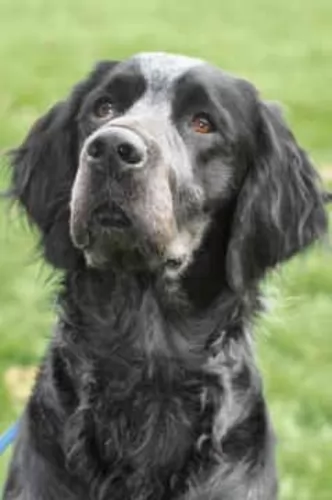 The Picardy Spaniel hails from France and has always been used as a gundog, having been crossed with different British hunting dogs.
The Picardy Spaniel hails from France and has always been used as a gundog, having been crossed with different British hunting dogs.
While this dog breed is related to the Blue Picardy Spaniel, the Picardy is the older of the two breeds. It has always been sought after by the French nobility for its hunting skills and the fact that its weather resistant coat allowed it to hunt in all kinds of weather conditions.
The dog’s popularity waned in the early 20th century. The UKC have recognized the Picardy Spaniel as a Gun Dog and the breed has also been accepted within the FCI as a Pointing dog group.
 The Australian pinscher, medium sized dog breed, with strong and solid body muscularity, is a happy dog with generally very positive personality. They don’t weight much, and they have usually athletic bodies because they are very active dog kind. Their head is built as a roundish triangle with wrinkled wide forehead and strong cheekbones. They have strong scissor bite and usually darker lips. They have brown or golden brown lively eyes, medium to small ears that fit perfectly to the head size. Their tails are most of the time happy and up in the air, usually fluffy because of the longer hairs on the tails.
The Australian pinscher, medium sized dog breed, with strong and solid body muscularity, is a happy dog with generally very positive personality. They don’t weight much, and they have usually athletic bodies because they are very active dog kind. Their head is built as a roundish triangle with wrinkled wide forehead and strong cheekbones. They have strong scissor bite and usually darker lips. They have brown or golden brown lively eyes, medium to small ears that fit perfectly to the head size. Their tails are most of the time happy and up in the air, usually fluffy because of the longer hairs on the tails.
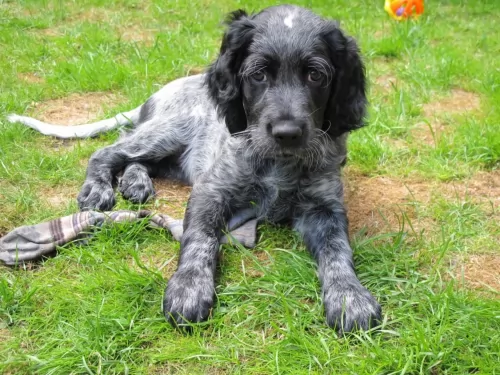 The Picardy Spaniel is larger than other spaniels. It is described as a medium sized dog, standing at 56 – 61cm in height and weighing between 20 and 25 kilograms. The body of the spaniel is squarely built and muscular body. The dog has long floppy ears and the coat which is shortish in areas except for feathering around the legs and belly can vary in colour from red to chestnut brown to sandy and chocolate. The tail is long and feathered.
The Picardy Spaniel is larger than other spaniels. It is described as a medium sized dog, standing at 56 – 61cm in height and weighing between 20 and 25 kilograms. The body of the spaniel is squarely built and muscular body. The dog has long floppy ears and the coat which is shortish in areas except for feathering around the legs and belly can vary in colour from red to chestnut brown to sandy and chocolate. The tail is long and feathered.
The Picardy Spaniel is a docile breed of dog and makes a great family pet, loving being playful with the children in the home and getting on well with other dogs. He is gentle but sociable and intelligent too and is easy to train and socialize.
Although he has been used as a hunting dog he can slot into life in the city or the countryside. He can be indoors or outdoors and still be happy, so long as his family members are close by.
He is an active dog though, and won’t be content to be sitting around for too long, loving nothing more than to be chasing a ball or going for a walk with you.
 If you decide to have an Austrian pinscher as a pet in a family with small children, you will make a great choice. Their playful nature and energetic behaviour have been accepted by the children very well. They have an affectionate attitude towards their family, and they will be the great watchdog for your children.
If you decide to have an Austrian pinscher as a pet in a family with small children, you will make a great choice. Their playful nature and energetic behaviour have been accepted by the children very well. They have an affectionate attitude towards their family, and they will be the great watchdog for your children.
Guarding a farm, large yard, animals on the farm or in a yard. Guarding and playing with children, long runs or long bike rides. They will follow you anywhere.
Since they are great with the family and children as well, they can’t be rated with a five-star grade for stranger friendliness and other dog’s friendliness. Sure, they can be trained to be very socialized if you have the time and the patience, but if you don’t you shouldn’t be surprised if they are generally not stranger friendly. It’s their nature. They are devoted only to the family and they usually have a hard time when their family leaves them. This breed is not advisable to be kept indoors or with the seniors that don’t move much.
The Austrian pincher's ability to learn fast and be trained quickly is not super good. They do well – they will listen to their owners always but they are not so great when it comes to learning trick for fun. They will be more than happy to run to catch the ball, but they won’t give it back because they can play alone. They can be learnt to do the basic things, but their lovable and playful nature will overall and they will end up asking for an ear scratch or a belly rub.
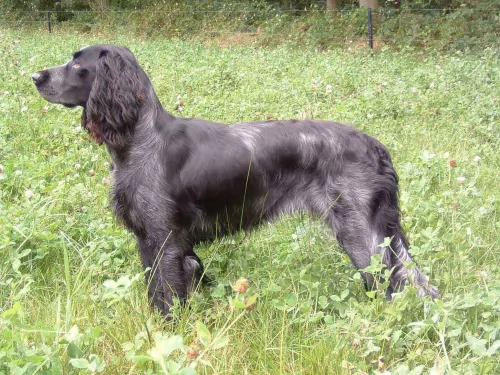 The Picardy Spaniel is a docile dog who forms strong bonds with his human family.
The Picardy Spaniel is a docile dog who forms strong bonds with his human family.
He doesn’t gel easily with strangers though, but socialization and training will at least make him well behaved among strangers.
A well-mannered Picardy Spaniel is a joy in the home, and this gentle dog is guaranteed to make you the most wonderfully loyal and loving pet and companion.
 They usually have no health issues like skin irritations, problems with eyes or ears, but they need to be groomed regularly because they shed a lot. They don’t need the regular baths, but when you do bathe them, take a good care of washing and rinsing their thick undercoat. Keep their ears clean and their claws tidy, and you will be happy together. There is a normal percentage of the joint injuries and heart malfunctions due to the increased activity. But, if you take a good care of your Austrian Pinscher, you wouldn’t have to worry about this at all.
They usually have no health issues like skin irritations, problems with eyes or ears, but they need to be groomed regularly because they shed a lot. They don’t need the regular baths, but when you do bathe them, take a good care of washing and rinsing their thick undercoat. Keep their ears clean and their claws tidy, and you will be happy together. There is a normal percentage of the joint injuries and heart malfunctions due to the increased activity. But, if you take a good care of your Austrian Pinscher, you wouldn’t have to worry about this at all.
 Without any major health issues, your Picardy can reach 14 years of age and possibly even older. A couple of common dog conditions to be on the watch for include:
Without any major health issues, your Picardy can reach 14 years of age and possibly even older. A couple of common dog conditions to be on the watch for include:
Your beautiful Picardy Spaniel has floppy ears and this opens up the tendency to suffer with ear infections. The inside of the ears are moist and hot and you as the dog owner can try to keep the inside of the ear clean and dry.
He is a dog that loves water too, and swimming encourages dampness. If you prefer not to work on the inside of the ears, dog groomers or your vet can clean the ears for you. An ear infection can be painful for your pet and it will require veterinary intervention.
These are dogs which can pick up weight quite easily. Dogs which are overweight are more prone to developing cancer, diabetes and heart disease, not to mention joint problems.
Other problems to look out for include cancer, bloat, dental disease and parasites.
 Just like any other active dog, the Austrian Pinscher loves to eat. But they usually know their limit and they are almost never obese. While they are pups, it is best for them to have meals in the morning, afternoon and in the evening. Meals should be rich in nutrients and in small portions. When they grow up, they will need two meals during the day. Take a good care while feeding them – read about the portion needed for their weight and don’t give him extra portions or human junk food. They generally don’t like raw meat, but you can chance on of the daily portions with some meat cooked in the water without any spices.
Just like any other active dog, the Austrian Pinscher loves to eat. But they usually know their limit and they are almost never obese. While they are pups, it is best for them to have meals in the morning, afternoon and in the evening. Meals should be rich in nutrients and in small portions. When they grow up, they will need two meals during the day. Take a good care while feeding them – read about the portion needed for their weight and don’t give him extra portions or human junk food. They generally don’t like raw meat, but you can chance on of the daily portions with some meat cooked in the water without any spices.
Organize your day to have an hour or two for this lovely pet. Austrian pinscher likes to be cuddled, petted and being played with. Be affectionate towards this dog breed because they will be happier and more protective towards you. They like to show love but they also have a need to be appreciated and loved. Keep them off the leach as much as possible and don’t leave them alone for a long period.
This lively and energetic dog breed will do well while they have enough place to run. If you have a small yard, take them for a run with you or drive a bike and let them follow. They like to bark, and they will do that if they want your attention.
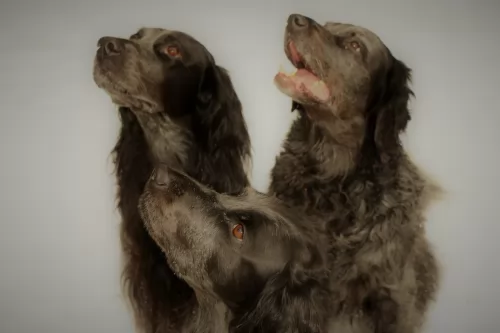 Your Picardy has a thick coat which sheds and the coat should be brushed at least twice a week to prevent matting. The ears of the Picardy Spaniel require special attention. Because they are long they will need to be cleaned and kept dry otherwise an ear infection can develop.
Your Picardy has a thick coat which sheds and the coat should be brushed at least twice a week to prevent matting. The ears of the Picardy Spaniel require special attention. Because they are long they will need to be cleaned and kept dry otherwise an ear infection can develop.
At the same time, check your pet over for ticks and fleas, check his eyes, keep the nails trimmed, and check inside his mouth for rotting teeth which can be the source of many health problems if left untreated.
If you have a puppy, you will need to provide 4 bowls of food in a 24 hour period. Check on the directions provided on the food packaging to see how much to feed your puppy.
By the time your Picardy is one year of age, he can move over to 2 bowls of food a day. Only the highest quality commercially manufactured food will be good enough for your dog. Food and its quality impacts the health and longevity of your pet.
Apart from dry kibble, try and provide some home-made food, keeping it as simple as possible. Dogs thrive on simple, consistent foods. Chopped up boiled chicken, brown rice, sweet potatoes, spinach and carrots added to the kibble now and then will thrill your pet. Occasionally you can also add in some raw meat.
Avoid feeding your dog things like coffee, chocolates, popcorn, nuts and onions as all these will just upset your dog's digestive system. The secret is to keep things simple and nutritious.
Make sure your pet always has access to fresh, cool water.